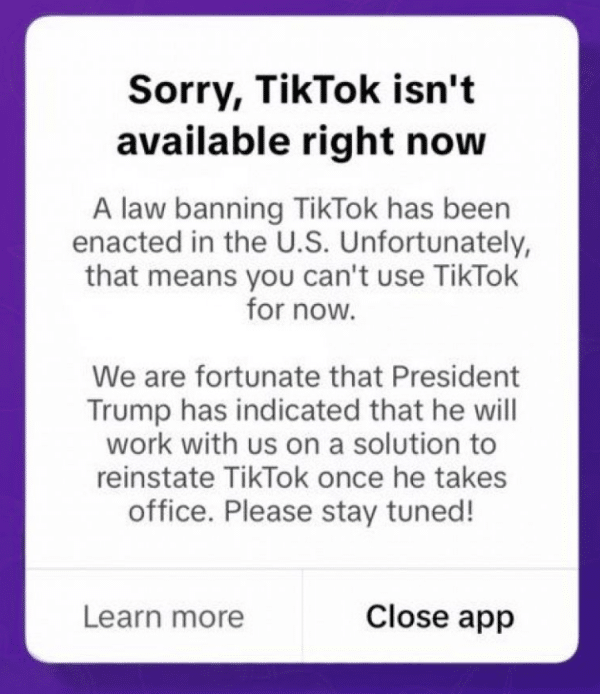In the early hours of Sunday, TikTok ceased operations in the United States, marking the enforcement of a federal ban on the platform. Users attempting to access the app were met with a message explaining the shutdown:
“A law has been enacted banning TikTok in the United States. Unfortunately, that means you can’t use TikTok for now. We’re fortunate that President Trump has indicated that he will work with us on a solution to reinstate TikTok once he takes office. Please stay tuned.”
The ban, implemented due to national security concerns, required TikTok to sever ties with its parent company, the Chinese firm ByteDance, or face closure.
Trump Considers Extension
Just before the app went offline, President-elect Donald Trump hinted at a possible 90-day reprieve for TikTok. Speaking to NBC on Saturday, he said he would “most likely” announce an extension on Monday, the day of his presidential inauguration.
TikTok CEO Shou Zi Chew reportedly plans to attend the inauguration and a Sunday rally with Trump, according to Reuters sources.
Notices to TikTok Users
TikTok’s 170 million U.S. users had been anticipating the shutdown. Late Saturday, many received a notice from the platform warning that services would be temporarily unavailable due to legal restrictions. The company reassured users that efforts were underway to restore operations.
Reports from The Information revealed that Oracle, which manages TikTok’s U.S. servers, began shutting down access on Saturday evening, hours before the ban took effect at 2:00 GMT.

National Security and Legal Concerns
The U.S. government has long raised concerns about TikTok’s ties to ByteDance, citing potential risks to national security and user data. A law passed last year required TikTok to either divest from ByteDance or cease operations in the U.S. by Sunday. On Friday, the Supreme Court unanimously upheld the law, emphasizing its justification on security grounds.
The White House clarified on Saturday that any action to extend TikTok’s operations would fall under the new administration. Press Secretary Karine Jean-Pierre stated:
“We see no reason for TikTok or other companies to take action in the coming days before the Trump administration takes office on Monday.”
Without a 90-day delay or formal intervention, companies hosting TikTok, such as Apple and Google, risk significant legal and financial liabilities.
China’s Response
The Chinese embassy in Washington condemned the ban, accusing the U.S. of unjustly using state power to suppress TikTok. A spokesperson declared, “China will take all necessary measures to resolutely safeguard its legitimate rights and interests.”
The ban has intensified tensions between the U.S. and China, further complicating trade and diplomatic relations.
Market and User Reactions
The uncertainty surrounding TikTok’s future has sent many of its predominantly young users searching for alternatives. China-based app RedNote has seen an increase in downloads, while competitors like Meta and Snap have experienced a rise in user activity and share prices as investors anticipate shifts in advertising revenue.
There remains a possibility that TikTok could restructure its U.S. operations to comply with the law. On Saturday, U.S.-based search engine startup Perplexity AI reportedly offered to merge with TikTok’s U.S. operations, according to Reuters.
Historical Context
The current shutdown echoes Trump’s 2020 attempt to ban TikTok and force its divestment, which was blocked by U.S. courts at the time. This new ban reflects an intensification of scrutiny over foreign-owned apps and their influence in the U.S. market.
For now, TikTok users in the U.S. remain in limbo, awaiting potential intervention by President Trump or a solution that could allow the platform to resume operations. Meanwhile, the tech and social media landscape braces for the broader implications of this unprecedented move.





